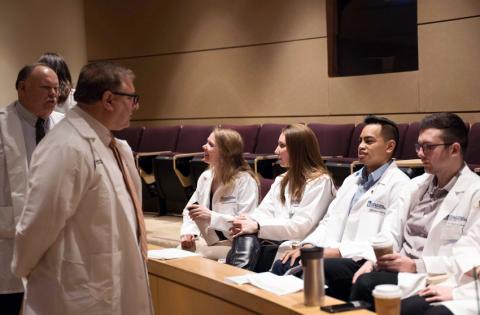Each year in the spring, rising first-years in the Master of Science in Anesthesia Program have the opportunity to take on leadership roles at their respective locations of study in Cleveland, Ohio; Houston, Texas; and Washington, D.C.
The MSA Network is pleased to announce the following students have been selected for the Class of 2020:
- Ariel Amman, Cleveland Professional Advocacy Representative
- Adriel Crispo, Cleveland Student Chief
- Jaclyn Fleener, Washington Professional Advocacy Representative
- Tedra Hall, Houston Student Chief
- Brijette Gray, Houston Professional Advocacy Representative
- Payam Ghaderi, Houston Professional Advocacy Representative
- Alexis Lambros, Washington Legislative Advocate
- Ah Le, Houston Student Chief
- Kevin Mayes, Washington Professional Advocacy Representative
- Brooke McDonald, Washington Legislative Advocate
- Josiah McFarland, Washington Student Chief
- Mallory Mews, Cleveland Professional Advocacy Representative
- George Patterson, Cleveland Biomedical Graduate Student Organization Representative
- Brett Siemon, Washington Student Chief
- Jose Yap, Cleveland Student Chief
These roles provide opportunities for students to act as advocates at various levels, from internally supporting graduate students at Case Western Reserve University to liaising with professional organizations such as the American Academy of Anesthesiologist Assistants and the American Society of Anesthesiologists to networking with legislators on Capitol Hill.
The number of student leaders varies by year and, depending on the location, students may either be nominated by the faculty or elected by their peers.
More on Leadership Roles at CWRU MSA
There are two leadership roles that are standard across all three CWRU MSA branches: student chiefs and professional advocacy representatives.
Student Chiefs
Similar to resident chief for medical residency programs, the student chief helps to organize and support the local cohort. While the student chief may do some work with scheduling and act as a member of the admissions team, they primarily act as a liaison between the MSA students and the department.
Professional Advocacy Representatives (PARs)
PARs acts as the liaison to AAAA, ASA, and other partner organizations. This role requires students to organize local fundraising indicatives, coordinate membership enrollment with their cohort, and to attend national meetings with these key partners.
Each location has two student chiefs and two professional advocacy representatives.
In Cleveland, one student per cohort is nominated to serve as the biomedical graduate student organization representative. The MSA student joins a council comprised of PhD, master’s, and post-baccalaureate students from across the School of Medicine. The BGSO representative is expected to attend all meetings and events, and to communicate key initiatives and events to the MSA cohorts to support curricular collaboration and extracurricular engagement across the School of Medicine.
In Washington, two students per cohort are nominated to serve as legislative advocates. These students network with legislators, observe at meetings, and advocate for healthcare. In the past, these advocates have also testified in cases concerning practice rights.
The opportunity to serve in these leadership positions prepares students to have a voice in their professional organizations and to network with other leaders across the School of Medicine, the university, and other major organizations. The leadership roles also exemplify the importance of advocacy at CWRU MSA. Learn more about our class leaders here.


